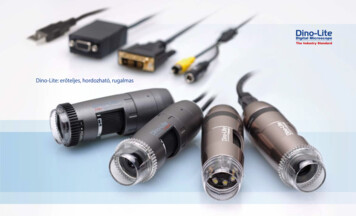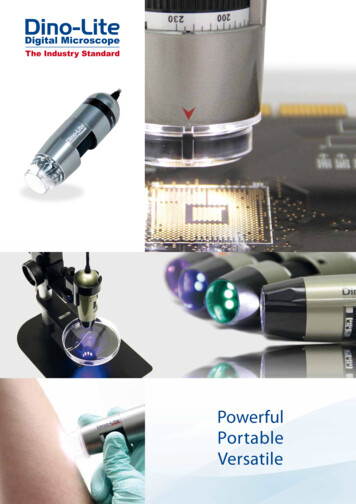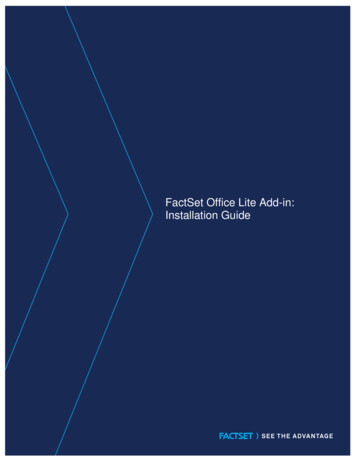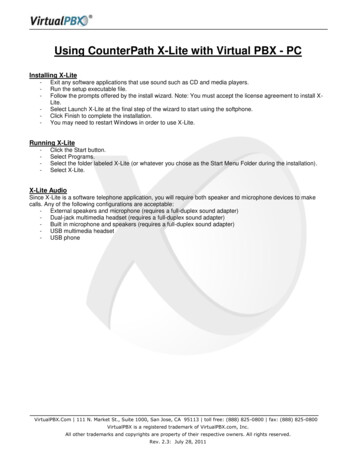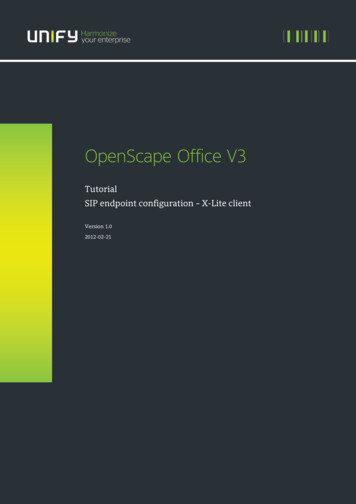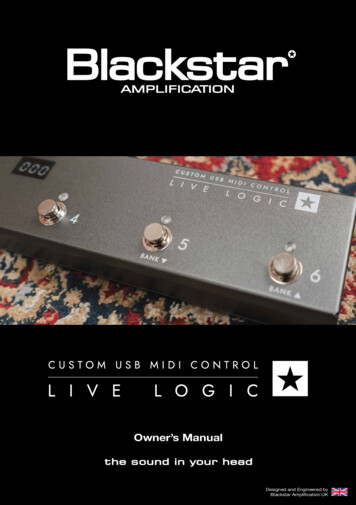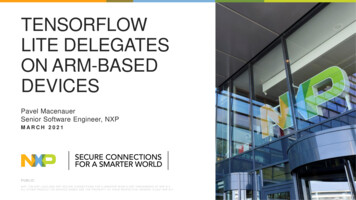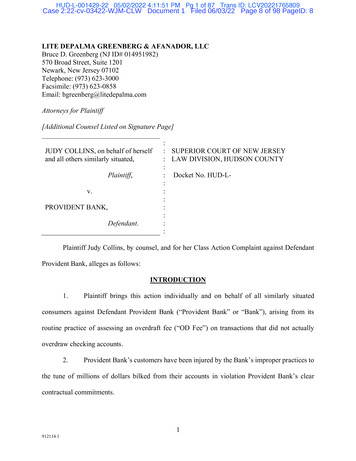
Transcription
HUD-L-001429-22 05/02/2022 4:11:51 PM Pg 1 of 87 Trans ID: LCV20221765809Case 2:22-cv-03422-WJM-CLW Document 1 Filed 06/03/22 Page 8 of 98 PageID: 8LITE DEPALMA GREENBERG & AFANADOR, LLCBruce D. Greenberg (NJ ID# 014951982)570 Broad Street, Suite 1201Newark, New Jersey 07102Telephone: (973) 623-3000Facsimile: (973) 623-0858Email: bgreenberg@litedepalma.comAttorneys for Plaintiff[Additional Counsel Listed on Signature Page]JUDY COLLINS, on behalf of herselfand all others similarly situated,Plaintiff,v.PROVIDENT BANK,Defendant.:: SUPERIOR COURT OF NEW JERSEY: LAW DIVISION, HUDSON COUNTY:: Docket No. HUD-L:::::::Plaintiff Judy Collins, by counsel, and for her Class Action Complaint against DefendantProvident Bank, alleges as follows:INTRODUCTION1.Plaintiff brings this action individually and on behalf of all similarly situatedconsumers against Defendant Provident Bank (“Provident Bank” or “Bank”), arising from itsroutine practice of assessing an overdraft fee (“OD Fee”) on transactions that did not actuallyoverdraw checking accounts.2.Provident Bank’s customers have been injured by the Bank’s improper practices tothe tune of millions of dollars bilked from their accounts in violation Provident Bank’s clearcontractual commitments.1912114.1
HUD-L-001429-22 05/02/2022 4:11:51 PM Pg 2 of 87 Trans ID: LCV20221765809Case 2:22-cv-03422-WJM-CLW Document 1 Filed 06/03/22 Page 9 of 98 PageID: 93.Plaintiff, on behalf of herself and a Class of similarly situated consumers, seeks toend Provident Bank’s abusive and predatory practices and force it to refund all of these impropercharges. Plaintiff asserts a claim for breach of contract, including breach of the covenant of goodfaith and fair dealing, and seeks damages, restitution, and injunctive relief, as set forth more fullybelow.PARTIES4.Plaintiff is a citizen and resident of Allentown, Pennsylvania.5.Defendant Provident Bank is engaged in the business of providing retail bankingservices to consumers, including Plaintiff and members of the putative Class. Provident Bank hasits headquarters in Jersey City, New Jersey and operates banking branches throughout New Jerseyand New York.JURISDICTION AND VENUE6.This Court has jurisdiction over this matter, as Provident Bank is headquartered inand does substantial business in Hudson County. For the same reasons, venue in this Court isproper pursuant to Rule 4:3-2(a) of the New Jersey Court Rules.FACTUAL BACKGROUND AND GENERAL ALLEGATIONSPROVIDENT BANK CHARGES OD FEES ON TRANSACTIONS THAT DO NOTACTUALLY OVERDRAW THE ACCOUNT7.Plaintiff has a checking account with Provident Bank.8.Provident Bank issues debit cards to its checking account customers, includingPlaintiff, which allows its customers to have electronic access to their checking accounts forpurchases, payments, withdrawals, and other electronic debit transactions.9.Pursuant to its Account Documents, Provident Bank charges fees for transactionsthat purportedly result in an overdraft.2912114.1
HUD-L-001429-22 05/02/2022 4:11:51 PM Pg 3 of 87 Trans ID: LCV20221765809Case 2:22-cv-03422-WJM-CLW Document 1 Filed 06/03/22 Page 10 of 98 PageID: 1010.Plaintiff brings this cause of action challenging Provident Bank’s practice ofcharging OD Fees on what are referred to in this complaint as “Authorize Positive, PurportedlySettle Negative Transactions” (“APPSN Transactions”).11.Here’s how it works. At the moment debit card transactions are authorized on anaccount with positive funds to cover the transaction, Provident Bank immediately reducesaccountholders’ checking accounts by the amount of the purchase, sets aside funds in a checkingaccount to cover that transaction, and as a result, the accountholder’s displayed “available balance”reflects that subtracted amount. Therefore, customers’ accounts will always have sufficientavailable funds to cover these transactions because Provident Bank has already sequestered thesefunds for payment.12.However, Provident Bank still assesses crippling OD Fees on many of thesetransactions and mispresents its practices in its Account Documents.13.Despite putting aside sufficient available funds for debit card and other POStransactions at the time those transactions are authorized, Provident Bank later assesses OD Feeson those same transactions when they purportedly settle days later into a negative balance. Thesetypes of transactions are APPSN Transactions.14.Provident Bank maintains a running account balance in real time, tracking fundsaccountholders have for immediate use. This running account balance is adjusted, in real-time, toaccount for debit card transactions at the precise instance they are made. When a customer makesa purchase with a debit card, Provident Bank sequesters the funds needed to pay the transaction,subtracting the dollar amount of the transaction from the customer’s available balance. Such fundsare not available for any other use by the accountholder, and such funds are specifically associatedwith a given debit card transaction.3912114.1
HUD-L-001429-22 05/02/2022 4:11:51 PM Pg 4 of 87 Trans ID: LCV20221765809Case 2:22-cv-03422-WJM-CLW Document 1 Filed 06/03/22 Page 11 of 98 PageID: 1115.That means when any subsequent, intervening transactions are initiated on achecking account, they are compared against an account balance that has already been reduced toaccount for any earlier debit card transactions. This means that many subsequent transactions incurOD Fees due to the unavailability of the funds sequestered for those debit card transactions.16.Still, despite keeping those held funds off-limits for other transactions, ProvidentBank improperly charges OD Fees on those APPSN Transactions, even though the APPSNTransactions always have sufficient available funds to be covered.17.Indeed, the Consumer Financial Protection Bureau (“CFPB”) has expressedconcern with this very issue, flatly calling the practice “unfair” and/or “deceptive” when:A financial institution authorized an electronic transaction, which reduced acustomer’s available balance but did not result in an overdraft at the time ofauthorization; settlement of a subsequent unrelated transaction that further loweredthe customer’s available balance and pushed the account into overdraft status; andwhen the original electronic transaction was later presented for settlement, becauseof the intervening transaction and overdraft fee, the electronic transaction alsoposted as an overdraft and an additional overdraft fee was charged. Because suchfees caused harm to consumers, one or more supervised entities were found to haveacted unfairly when they charged fees in the manner described above. Consumerslikely had no reason to anticipate this practice, which was not appropriatelydisclosed. They therefore could not reasonably avoid incurring the overdraft feescharged. Consistent with the deception findings summarized above, examinersfound that the failure to properly disclose the practice of charging overdraft fees inthese circumstances was deceptive. At one or more institutions, examiners founddeceptive practices relating to the disclosure of overdraft processing logic forelectronic transactions. Examiners noted that these disclosures created amisimpression that the institutions would not charge an overdraft fee with respectto an electronic transaction if the authorization of the transaction did not push thecustomer’s available balance into overdraft status. But the institutions assessedoverdraft fees for electronic transactions in a manner inconsistent with the overallnet impression created by the disclosures. Examiners therefore concluded that thedisclosures were misleading or likely to mislead, and because such misimpressionscould be material to a reasonable consumer’s decision-making and actions,examiners found the practice to be deceptive. Furthermore, because consumerswere substantially injured or likely to be so injured by overdraft fees assessedcontrary to the overall net impression created by the disclosures (in a manner notoutweighed by countervailing benefits to consumers or competition), and becauseconsumers could not reasonably avoid the fees (given the misimpressions created4912114.1
HUD-L-001429-22 05/02/2022 4:11:51 PM Pg 5 of 87 Trans ID: LCV20221765809Case 2:22-cv-03422-WJM-CLW Document 1 Filed 06/03/22 Page 12 of 98 PageID: 12by the disclosures), the practice of assessing fees under these circumstances wasfound to be unfair.Consumer Financial Protection Bureau, Winter 2015 “Supervisory Highlights.”18.There is no justification for these practices, other than to maximize ProvidentBank’s OD Fee revenue. APPSN Transactions only exist because intervening checking accounttransactions supposedly reduce an account balance. But Provident Bank is free to protect itsinterests and either reject those intervening transactions or charge OD Fees on those interveningtransactions—and it does the latter to the tune of millions of dollars each year. But Provident Bankwas not content with these millions in OD Fees. Instead, it sought millions more in OD Fees onthese APPSN Transactions.19.Besides being unfair and unjust, these practices breach contract promises made inProvident Bank’s adhesion contracts—contracts which fail to inform accountholders about the truenature of Provident Bank’s processes and practices. These practices also exploit contractualdiscretion to gouge accountholders.20.In plain, clear, and simple language, the Account Documents covering OD Feespromise that Provident Bank will charge OD Fees ONLY on transactions that have insufficientfunds to cover that transaction.21.In short, Provident Bank is not authorized by contract to charge OD Fees ontransactions that have not overdrawn an account, but it has done so and continues to do so.A.Mechanics of a Debit Card Transaction22.A debit card transaction occurs in two parts. First, authorization for the purchaseamount is instantaneously obtained by the merchant from Provident Bank. When a merchantphysically or virtually “swipes” a customer’s debit card, the credit card terminal connects, via an5912114.1
HUD-L-001429-22 05/02/2022 4:11:51 PM Pg 6 of 87 Trans ID: LCV20221765809Case 2:22-cv-03422-WJM-CLW Document 1 Filed 06/03/22 Page 13 of 98 PageID: 13intermediary, to Provident Bank, which verifies that the customer’s account is valid and thatsufficient available funds exist to cover the transaction amount.67.At this step, if the transaction is approved, Provident Bank immediately decrementsthe funds in an accountholder’s account and sequesters funds in the amount of the transaction butdoes not yet transfer the funds to the merchant.68.Indeed, the entire purpose of the immediate debit and hold of positive funds is toensure that there are enough funds in the account to pay the transaction when it settles, as discussedin the Federal Register notice announcing revisions to certain provisions of the Truth in LendingAct regulations:When a consumer uses a debit card to make a purchase, a hold may be placed onfunds in the consumer’s account to ensure that the consumer has sufficient funds inthe account when the transaction is presented for settlement. This is commonlyreferred to as a “debit hold.” During the time the debit hold remains in place, whichmay be up to three days after authorization, those funds may be unavailable for theconsumer’s use for other transactions.Federal Reserve Board, Office of Thrift Supervision, and National Credit Union Administration,Unfair or Deceptive Acts or Practices, 74 FR 5498-01 (Jan. 29, 2009).69.Sometime thereafter, the funds are actually transferred from the customer’s accountto the merchant’s account.70.Provident Bank (like all banks and credit unions) decides whether to “pay” debitcard transactions at authorization. After that, Provident Bank is obligated to pay the transaction nomatter what. For debit card transactions, that moment of decision can only occur at the point ofsale, at the instant the transaction is authorized or declined. It is at that point—and only that point—when Provident Bank may choose to either pay the transaction or decline it. When the time comesto actually settle the transaction, it is too late—the financial institution has no discretion and mustpay the charge. This “must pay” rule applies industry wide and requires that, once a financial6912114.1
HUD-L-001429-22 05/02/2022 4:11:51 PM Pg 7 of 87 Trans ID: LCV20221765809Case 2:22-cv-03422-WJM-CLW Document 1 Filed 06/03/22 Page 14 of 98 PageID: 14institution authorizes a debit card transaction, it “must pay” it when the merchant later makes ademand, regardless of other account activity. See Electronic Fund Transfers, 74 Fed. Reg. 5903301, 59046 (Nov. 17, 2009).71.There is no change—no impact whatsoever—to the available funds in an accountwhen this step occurs.B.Provident Bank’s Account Contract72.Plaintiff has a checking account with Provident Bank, which is governed byProvident Bank’s standardized Account Documents.73.The Account Documents indicate that Provident Bank will pay overdrafts onlywhen an accountholder lacks sufficient funds to pay for a transaction, reserving discretion forwhether to pay an overdraft:The amount of overdraft coverage available will be based upon the way you handle youraccount. As such, your account activity will be automatically reviewed each day todetermine the amount of funds available to cover items presented that day for which youdo not have sufficient collected funds on deposit (i.e. your inadvertent overdrafts). Anyand all fees and charges, including up to six (6) insufficient funds/overdraft fees perbusiness day (set forth in our Consumer Deposit Accounts Terms and ConditionsAgreement), will be charged against the amount available to cover overdrafts and willapply singularly to each transaction that overdraws your account whereby the resultingoverdraft balance excluding the overdraft fee is greater than 5.00. Transactions subject tothis Policy include overdrafts resulting from, but not limited to: payments authorized bycheck, ACH/electronic items, and ATM/debit card/withdrawals/purchases.We may refuse to pay an overdraft for you at any time, even though your account isin good standing and even though we may have previously paid overdrafts for you.You will be notified by mail of any insufficient funds items paid or returned unpaid thatyou may have (including related insufficient funds and/ or overdraft fees); however, wehave no obligation to notify you before we pay or return any item. The amount of anyoverdrafts plus our insufficient funds and/or overdraft fee(s) that you owe us shall bedue and payable upon demand. If there is an overdraft paid by us on an account withmore than one (1) owner, each owner (and agent, if applicable) shall be jointly andseverally liable for such overdrafts plus our fee(s) as previously noted.Exhibit A, p. 64.7912114.1
HUD-L-001429-22 05/02/2022 4:11:51 PM Pg 8 of 87 Trans ID: LCV20221765809Case 2:22-cv-03422-WJM-CLW Document 1 Filed 06/03/22 Page 15 of 98 PageID: 1574.The Overdraft Opt-In form makes the same promises:What You Need to Know about Overdrafts and Overdraft Fees.An overdraft occurs when you do not have enough money in your account to cover atransaction, but we pay it anyway. We can cover your overdrafts in two different ways: We have standard overdraft practices (Overdraft Privilege - ODP) that come with youraccount. We also offer other overdraft protection plans, such as a line of credit or a link toanother deposit account, which may be less expensive than our standard overdraftpractices. To learn more, ask us about these plans.What are the standard overdraft practices that come with my account?We do authorize and pay overdrafts for the following types of transactions: Checks and other transactions made using your checking account number Automatic bill paymentsWe do not authorize and pay overdrafts for the following types of transactions unless youask us to: ATM transactions Everyday debit card transactionsWe pay overdrafts at our discretion, which means we do not guarantee that we willalways authorize and pay any type of transaction.If we do not authorize and pay an overdraft, your transaction will be declined.What fees will I be charged if Provident pays my overdraft?Under our standard overdraft practices: We will charge you a fee of 35.00* each time we pay an overdraft. The total number of insufficient/overdraft fees we can charge you through OverdraftPrivilege for overdrawing your account is limited to six (6) fees in one (1) business day.No overdraft fee is charged if the resulting overdraft balance is 5.00 or less.Exhibit A, p. 65.75.For APPSN Transactions, which are immediately deducted from a positive accountbalance and should be held aside for payment of that same transaction, there are always funds tocover those transactions—yet Provident Bank assesses OD Fees on them anyway.8912114.1
HUD-L-001429-22 05/02/2022 4:11:51 PM Pg 9 of 87 Trans ID: LCV20221765809Case 2:22-cv-03422-WJM-CLW Document 1 Filed 06/03/22 Page 16 of 98 PageID: 1676.The above promises mean that transactions are overdraft transactions only whenthey are authorized into a negative account balance. Of course, that is not true for APPSNTransactions.77.APPSN transactions are always initiated at a time when there are sufficientavailable funds in the account.78.In fact, Provident Bank actually authorizes transactions on positive funds, claimsto set those funds aside on hold, but then fails to use those same funds to settle those sametransactions. Instead, it uses a secret posting process described below.79.All the above representations and contractual promises are untrue. In fact, ProvidentBank charges OD Fees even when sufficient funds exist to cover transactions that are authorizedinto a positive balance. No express language in any document states that Provident Bank mayimpose OD Fees on any APPSN Transactions.80.First, and most fundamentally, Provident Bank charges OD Fees on debit cardtransactions for which there are sufficient funds available to cover the transactions. That is despitecontractual representations that Provident Bank will only charge OD Fees on transactions withinsufficient available funds to cover a given transaction.81.Provident Bank assesses OD Fees on APPSN Transactions that do have sufficientfunds available to cover them throughout their lifecycle.82.Provident Bank’s practice of charging OD Fees even when sufficient availablefunds exist to cover a transaction violates a contractual promise not to do so. This discrepancybetween Provident Bank’s actual practice and the contract causes accountholders like the Plaintiffto incur more OD Fees than they should.9912114.1
HUD-L-001429-22 05/02/2022 4:11:51 PM Pg 10 of 87 Trans ID: LCV20221765809Case 2:22-cv-03422-WJM-CLW Document 1 Filed 06/03/22 Page 17 of 98 PageID: 1783.Next, sufficient funds for APPSN Transactions are actually debited from theaccount immediately, consistent with standard industry practice.84.Because these withdrawals take place upon initiation, they cannot be re-debitedlater. But that is what Provident Bank does when it re-debits the account during a secret batchposting process.85.In reality, Provident Bank’s actual practice is to deduct the same debit cardtransaction twice to determine if the transaction overdraws an account—both at the time atransaction is authorized and later at the time of settlement.86.At the time of settlement, however, an available balance does not change at all forthese transactions previously authorized into good funds. As such, Provident Bank cannot thencharge an OD Fee on such transaction because the available balance has not been renderedinsufficient due to the pseudo-event of settlement.87.Upon information and belief, something more is going on: at the moment a debitcard transaction is getting ready to settle, Provident Bank does something new and unexpected,during the middle of the night, during its nightly batch posting process. Specifically, ProvidentBank releases the hold placed on funds for the transaction for a split second, putting money backinto the account, then re-debits the same transaction a second time.88.This secret step allows Provident Bank to charge OD Fees on transactions that nevershould have caused an overdraft—transactions that were authorized into sufficient funds, and forwhich Provident Bank specifically set aside money to pay them.89.This discrepancy between Provident Bank’s actual practices and the contract causesaccountholders to incur more OD Fees than they should.10912114.1
HUD-L-001429-22 05/02/2022 4:11:51 PM Pg 11 of 87 Trans ID: LCV20221765809Case 2:22-cv-03422-WJM-CLW Document 1 Filed 06/03/22 Page 18 of 98 PageID: 1890.In sum, there is a huge gap between Provident Bank’s practices as described in theAccount Documents and Provident Bank’s practices in reality.C.Provident Bank Abuses Contractual Discretion91.Provident Bank’s treatment of debit card transactions to charge OD Fees is notsimply a breach of the express terms of the numerous Account Documents. In addition, ProvidentBank exploits contractual discretion to the detriment of accountholders when it uses these policies.92.Provident Bank uses its contractual discretion to cause APPSN Transactions toincur OD Fees by knowingly authorizing later transactions that it allows to consume availablefunds previously sequestered for APPSN Transactions.93.Provident Bank uses this contractual discretion unfairly to extract OD Fees ontransactions that no reasonable accountholder would believe could cause OD Fees.D.Reasonable Accountholders Understand Debit Card/POS Transactions AreDebited Immediately94.The assessment of OD Fees on APPSN Transactions is fundamentally inconsistentwith immediate deduction and holding of funds for debit card/POS transactions. That is because,if funds are immediately debited from the balance and held, they cannot be depleted by interveningtransactions (and it is that subsequent depletion that is the necessary condition of APPSNTransactions). If funds are immediately debited from the available balance, then they arenecessarily available to be applied to the debit card transactions for which they are debited.95.Provident Bank was and is aware that this is precisely how accountholdersreasonably understand such transactions to work.96.Provident Bank knows that many accountholders prefer debit cards for this veryreason. Research indicates that accountholders prefer debit cards as a budgeting device because11912114.1
HUD-L-001429-22 05/02/2022 4:11:51 PM Pg 12 of 87 Trans ID: LCV20221765809Case 2:22-cv-03422-WJM-CLW Document 1 Filed 06/03/22 Page 19 of 98 PageID: 19they do not allow debt like credit cards do, and because the money comes directly out of a checkingaccount.97.Consumer Action, a national nonprofit consumer education and advocacyorganization, advises consumers determining whether they should use a debit card that “[t]here isno grace period on debit card purchases the way there is on credit card purchases; the money isimmediately deducted from your checking account. Also, when you use a debit card you lose theone or two days of ‘float’ time that a check usually takes to clear.” What Do I Need to Know what do i need to know about using a debit card (last visitedJune 4, 2021).98.Further, Consumer Action informs consumers that “Debit cards offer theconvenience of paying with plastic without the risk of overspending. When you use a debit card,you do not get a monthly bill. You also avoid the finance charges and debt that can come with acredit card if not paid off in full.” Understanding Debit Cards, Consumer cles/understanding debit cards (last visited June 4,2021).99.This understanding is a large part of the reason that debit cards have risen inpopularity. The number of terminals that accept debit cards in the United States increased byapproximately 1.4 million in a recent five year period and, with that increasing ubiquity, consumershave (along with credit cards) viewed debit cards “as a more convenient option than refilling theirwallets with cash from an ATM.” Maria LaMagna, Debit Cards Gaining on Case for SmallestPurchases, MarketWatch, Mar. 23, 2016, 12114.1
HUD-L-001429-22 05/02/2022 4:11:51 PM Pg 13 of 87 Trans ID: LCV20221765809Case 2:22-cv-03422-WJM-CLW Document 1 Filed 06/03/22 Page 20 of 98 PageID: 20100.Not only have accountholders increasingly transitioned from cash to debit cards,but they believe that a debit card purchase is the fundamental equivalent of a cash purchase, withthe swipe of a card equating to handing over cash, permanently and irreversibly.101.Provident Bank was aware of accountholder perception that debit transactionsreduce an available balance in a specified order—namely, the moment they are actually initiated—and its account agreement only supports this perception.E.Plaintiff’s Experience102.As an example, on September 8, 2020, Plaintiff was assessed OD Fees for debitcard transactions that settled that day, despite the fact that positive funds were deductedimmediately, prior to that day, for the transaction on which Plaintiff was assessed the OD Fee. Atthe time that the positive funds were deducted, Plaintiff had a positive balance, which would nothave caused an OD Fee.CLASS ACTION ALLEGATIONS103.Plaintiff brings this action on behalf of herself and all others similarly situatedpursuant to Rule 4:32 of the New Jersey Court Rules. This action satisfies the numerosity,commonality, typicality, adequacy, predominance and superiority requirements of Rule 4:32-1.104.The proposed class is defined as:All Provident Bank checking account holders who, during the applicable statute oflimitations, were charged OD Fees on transactions that were authorized into apositive available balance (the “Class”)105.Plaintiff reserves the right to modify or amend the definition of the proposed Classbefore the Court determines whether certification is appropriate.106.Excluded from the Class are Provident Bank, its parents, subsidiaries, affiliates,officers and directors, any entity in which Provident Bank has a controlling interest, all customers13912114.1
HUD-L-001429-22 05/02/2022 4:11:51 PM Pg 14 of 87 Trans ID: LCV20221765809Case 2:22-cv-03422-WJM-CLW Document 1 Filed 06/03/22 Page 21 of 98 PageID: 21who make a timely election to be excluded, governmental entities, and all judges assigned to hearany aspect of this litigation, as well as their immediate family members.107.The members of the Class are so numerous that joinder is impractical. The Classconsists of thousands of members, the identity of whom is within the knowledge of and can beascertained only by resort to Provident Bank’s records.108.The claims of Plaintiff are typical of the claims of the Class in that she, like allClass members, was charged improper OD Fees. Plaintiff, like all Class members, has beendamaged by Provident Bank’s misconduct in that she paid improper OD Fees. Furthermore, thefactual basis of Provident Bank’s misconduct is common to all Class members, and represents acommon thread of unfair and unconscionable conduct resulting in injury to all members of theClass.109.There are numerous questions of law and fact common to the Class and thosecommon questions predominate over any questions affecting only individual Class members.110.Among the questions of law and fact common to the Class are whether ProvidentBank:a.Charged OD Fees on transactions when those transactions did not overdrawaccounts;b.Breached its contract with consumers by charging OD Fees on transactionswhen those transactions did not overdraw accounts;c.Breached the covenant of good faith and fair dealing by charging OD Feeson transactions when those transactions did not overdraw accounts;d.Whether Plaintiff and the Class were damaged by Provident Bank’s conductand if so, the proper measure of damages.14912114.1
HUD-L-001429-22 05/02/2022 4:11:51 PM Pg 15 of 87 Trans ID: LCV20221765809Case 2:22-cv-03422-WJM-CLW Document 1 Filed 06/03/22 Page 22 of 98 PageID: 22111.Plaintiff is committed to the vigorous prosecution of this action and has retainedcompetent counsel experienced in the prosecution of class actions and, in particular, class actionson behalf of consumers and against financial institutions. Accordingly, Plaintiff is an adequaterepresentative and will fairly and adequately protect the interests of the Class.112.A class action is superior to other available methods for the fair and efficientadjudication of this controversy. Since the amount of each individual Class member’s claim issmall relative to the complexity of the litigation, and due to the financial resources of ProvidentBank, no Class member could afford to seek legal redress individually for the claims allegedherein. Therefore, absent a class action, the Class members will continue to suffer losses andProvident Bank’s misconduct will proceed without remedy. Moreover, given that the improperfees were assessed in a uniform manner, common issues predominate over any questions, to theextent there are any, affecting only individual members.113.Even if Class members themselves could afford such individual litigation, the courtsystem could not. Given the complex legal and factual issues involved, individualized litigationwould significantly increase the delay and expense to all parties and to the Court. Individualizedlitigation would also create the potential for inconsistent or contradictory rulings. By contrast, aclass action presents far fewer management difficulties, allows claims to be heard which mightotherwise go unheard because of the relative expense of bringing individual lawsuits, and providesthe benefits of adjudication, economie
Plaintiff has a checking account with Provident Bank. 8. Provident Bank issues debit cards to its checking account customers, including . 9. Pursuant to its Account Documents, Provident Bank charges fees for transactions that purportedly result in an overdraft. HUD-L-001429-22 05/02/2022 4:11:51 PM Pg 2 of 87 Trans ID: LCV20221765809
